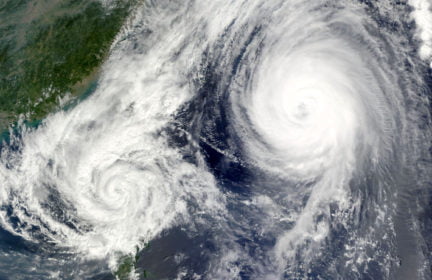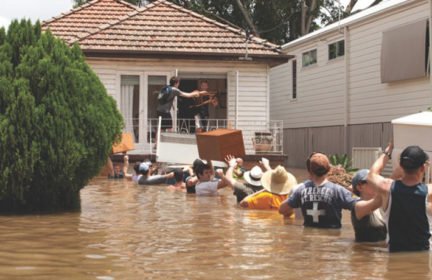“It can’t happen to me” – A tale of two FEMA studies, statistics and Normalcy Bias
My notes from the early hours this morning:
2012 FEMA study – Almost 1/2 of all Americans don’t believe that a disaster will hurt their community.
2015 FEMA study – Less than 1/2 of American households had an Emergency Preparedness plan or discussed one with their family.
I remember thinking “denial ain’t just a river in Egypt, honey.”
But denial is also not normalcy bias. Normalcy bias aka Ostrich Effect is a cognitive bias that occurs when people facing imminent disaster are warned and either disbelieve the warning or minimize the threat.
We need to know about and factor in denial and normalcy bias into our preparedness, for ourselves and family members.
The time it takes to process denial and normalcy bias can put people in grave danger. I believe part of the solution is to be aware of the potential for a problem and formulate how you will deal with it before it happens. https://en.wikipedia.org/wiki/Normalcy_bias#:~:text=Normalcy%20bias%2C%20or%20normality%20bias,and%20its%20potential%20adverse%20effects.
Begin Quote
The normalcy bias may be caused in part by the way the brain processes new data. Research suggests that even when the brain is calm, it takes 8–10 seconds to process new information. Stress slows the process, and when the brain cannot find an acceptable response to a situation, it fixates on a single and sometimes default solution that may or may not be correct. An evolutionary reason for this response could be that paralysis gives an animal a better chance of surviving an attack and predators are less likely to see prey that is not moving.”[10]
Effects
About 70% of people reportedly display normalcy bias in disasters.[3] Normalcy bias has been described as “one of the most dangerous biases we have”. The lack of preparation for disasters often leads to inadequate shelter, supplies, and evacuation plans. Even when all these things are in place, individuals with a normalcy bias often refuse to leave their homes.[17][better source needed]”
Normalcy bias can cause people to drastically underestimate the effects of the disaster. Therefore, people think that they will be safe even though information from the radio, television, or neighbors gives them reasons to believe there is a risk. The normalcy bias creates a cognitive dissonance that people then must work to eliminate. Some manage to eliminate it by refusing to believe new warnings coming in and refusing to evacuate (maintaining the normalcy bias), while others eliminate the dissonance by escaping the danger. The possibility that some people may refuse to evacuate causes significant problems in disaster planning.[18]
End Quote
https://community.fema.gov/story/2020-NHS-Data-Digest-Summary-Results What the data indicates:
Begin quote:
The percentage of the adult population that have no intent to prepare (stage 1) has decreased substantially since 2013 (21% in 2013 to 9% in 2020).The percentage of the adult population that is not prepared but understands the importance of preparing and intends to do so within the next year (stages 2 and 3) has increased by 12 percentage points since 2013 (28% in 2013 to 40% in 2020) supporting the notion that there is an increased social awareness of the importance of preparing.”
“The percentage of the population that perceives themselves as prepared (stages 4 and 5) increased only slightly from 2013 (49% in 2013 to 51% in 2020), implying that the rate at which the adult population becomes prepared or maintains preparedness has stalled over the years, despite any year to year (e.g., 2020 versus 2019) fluctuations. This suggests a critical need to encourage, guide, and assist individuals and communities progress from intent-to-prepare to engagement in preparedness action and activities.”
And from same data:
“Overall, the estimated number of preparedness actions taken has increased from 2019.
68% of NHS respondents have taken 3 or more of the 6 basic preparedness actions; an increase of 6% from 2019.
For the second year in a row, the percentage of people reporting four of the six basic actions increased.
The number of people who indicated that they talked to others about getting prepared increased from 45% to 48%.
The number of people who indicated they participated in an emergency drill increased from 49% to 56%.”
NHS data shows that, when individuals indicate that they’ve taken one preparedness action, we can expect that they will take additional preparedness actions.
NHS data shows that preparedness actions can vary by stage of preparedness, hazard areas, and even demographics. As such, customizing preparedness messaging based on these factors will likely result in more effective messaging.
Begin Quote
The good news is nearly three-quarters of Americans (73 percent) have taken at least one step to prepare for a natural disaster, most commonly assembling a disaster supplies kit (34 percent), creating an evacuation plan (32 percent), or backing up and storing personal medical and financial records in a safe place (31 percent). The bad news is only 15 percent have created a disaster plan to protect their finances. And concerningly, a little more than a quarter of Americans (27 percent) have not taken any steps at all to prepare for a natural disaster.
Steps Americans Have Taken to Prepare for Natural Disaster
34% Assembled a disaster supplies kit (first-aid kit, food, water, tools, etc.)
32% Created an evacuation plan
31% Backed up & stored personal, medical & financial records in a safe, accessible place
27% Evaluated insurance needs to assure adequate coverage
26% Taken an inventory of assets & possessions for insurance purposes
24% Contributed to an emergency saving account
19% Created or updated an estate plan and/or will
19% Purchased additional insurance (e.g., flood insurance, hurricane insurance, etc.)
15% Created a disaster plan to protect finances
2% Other
27% I have not taken any steps to prepare for a natural disaster
End Quote
After I finished wading through the articles, I wondered how can we help others understand the need for emergency preparedness without jeopardizing our own preparedness? Is there a way to do improve these numbers?
-
Comments (5)
-


